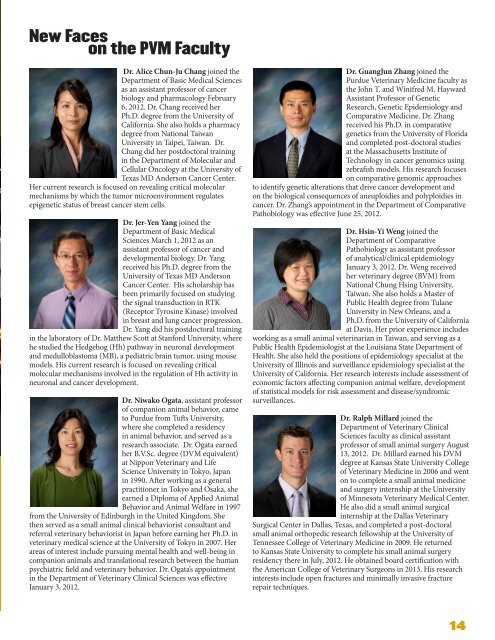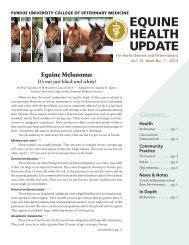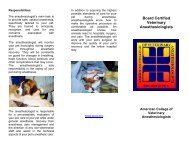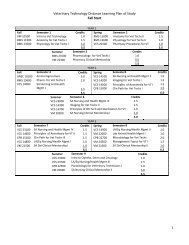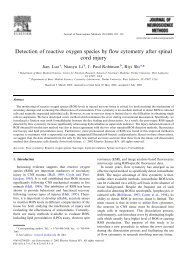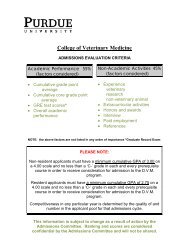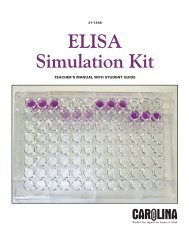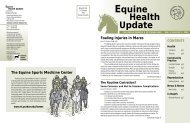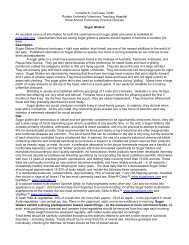2013 PVM Report - Purdue University School of Veterinary Medicine
2013 PVM Report - Purdue University School of Veterinary Medicine
2013 PVM Report - Purdue University School of Veterinary Medicine
Create successful ePaper yourself
Turn your PDF publications into a flip-book with our unique Google optimized e-Paper software.
New Faces<br />
on the <strong>PVM</strong> Faculty<br />
Dr. Alice Chun-Ju Chang joined the<br />
Department <strong>of</strong> Basic Medical Sciences<br />
as an assistant pr<strong>of</strong>essor <strong>of</strong> cancer<br />
biology and pharmacology February<br />
6, 2012. Dr. Chang received her<br />
Ph.D. degree from the <strong>University</strong> <strong>of</strong><br />
California. She also holds a pharmacy<br />
degree from National Taiwan<br />
<strong>University</strong> in Taipei, Taiwan. Dr.<br />
Chang did her postdoctoral training<br />
in the Department <strong>of</strong> Molecular and<br />
Cellular Oncology at the <strong>University</strong> <strong>of</strong><br />
Texas MD Anderson Cancer Center.<br />
Her current research is focused on revealing critical molecular<br />
mechanisms by which the tumor microenvironment regulates<br />
epigenetic status <strong>of</strong> breast cancer stem cells.<br />
Dr. Jer-Yen Yang joined the<br />
Department <strong>of</strong> Basic Medical<br />
Sciences March 1, 2012 as an<br />
assistant pr<strong>of</strong>essor <strong>of</strong> cancer and<br />
developmental biology. Dr. Yang<br />
received his Ph.D. degree from the<br />
<strong>University</strong> <strong>of</strong> Texas MD Anderson<br />
Cancer Center. His scholarship has<br />
been primarily focused on studying<br />
the signal transduction in RTK<br />
(Receptor Tyrosine Kinase) involved<br />
in breast and lung cancer progression.<br />
Dr. Yang did his postdoctoral training<br />
in the laboratory <strong>of</strong> Dr. Matthew Scott at Stanford <strong>University</strong>, where<br />
he studied the Hedgehog (Hh) pathway in neuronal development<br />
and medulloblastoma (MB), a pediatric brain tumor, using mouse<br />
models. His current research is focused on revealing critical<br />
molecular mechanisms involved in the regulation <strong>of</strong> Hh activity in<br />
neuronal and cancer development.<br />
Dr. Niwako Ogata, assistant pr<strong>of</strong>essor<br />
<strong>of</strong> companion animal behavior, came<br />
to <strong>Purdue</strong> from Tufts <strong>University</strong>,<br />
where she completed a residency<br />
in animal behavior, and served as a<br />
research associate. Dr. Ogata earned<br />
her B.V.Sc. degree (DVM equivalent)<br />
at Nippon <strong>Veterinary</strong> and Life<br />
Science <strong>University</strong> in Tokyo, Japan<br />
in 1990. After working as a general<br />
practitioner in Tokyo and Osaka, she<br />
earned a Diploma <strong>of</strong> Applied Animal<br />
Behavior and Animal Welfare in 1997<br />
from the <strong>University</strong> <strong>of</strong> Edinburgh in the United Kingdom. She<br />
then served as a small animal clinical behaviorist consultant and<br />
referral veterinary behaviorist in Japan before earning her Ph.D. in<br />
veterinary medical science at the <strong>University</strong> <strong>of</strong> Tokyo in 2007. Her<br />
areas <strong>of</strong> interest include pursuing mental health and well-being in<br />
companion animals and translational research between the human<br />
psychiatric field and veterinary behavior. Dr. Ogata’s appointment<br />
in the Department <strong>of</strong> <strong>Veterinary</strong> Clinical Sciences was effective<br />
January 3, 2012.<br />
Dr. GuangJun Zhang joined the<br />
<strong>Purdue</strong> <strong>Veterinary</strong> <strong>Medicine</strong> faculty as<br />
the John T. and Winifred M. Hayward<br />
Assistant Pr<strong>of</strong>essor <strong>of</strong> Genetic<br />
Research, Genetic Epidemiology and<br />
Comparative <strong>Medicine</strong>. Dr. Zhang<br />
received his Ph.D. in comparative<br />
genetics from the <strong>University</strong> <strong>of</strong> Florida<br />
and completed post-doctoral studies<br />
at the Massachusetts Institute <strong>of</strong><br />
Technology in cancer genomics using<br />
zebrafish models. His research focuses<br />
on comparative genomic approaches<br />
to identify genetic alterations that drive cancer development and<br />
on the biological consequences <strong>of</strong> aneuploidies and polyploidies in<br />
cancer. Dr. Zhang’s appointment in the Department <strong>of</strong> Comparative<br />
Pathobiology was effective June 25, 2012.<br />
Dr. Hsin-Yi Weng joined the<br />
Department <strong>of</strong> Comparative<br />
Pathobiology as assistant pr<strong>of</strong>essor<br />
<strong>of</strong> analytical/clinical epidemiology<br />
January 3, 2012. Dr. Weng received<br />
her veterinary degree (BVM) from<br />
National Chung Hsing <strong>University</strong>,<br />
Taiwan. She also holds a Master <strong>of</strong><br />
Public Health degree from Tulane<br />
<strong>University</strong> in New Orleans, and a<br />
Ph.D. from the <strong>University</strong> <strong>of</strong> California<br />
at Davis. Her prior experience includes<br />
working as a small animal veterinarian in Taiwan, and serving as a<br />
Public Health Epidemiologist at the Louisiana State Department <strong>of</strong><br />
Health. She also held the positions <strong>of</strong> epidemiology specialist at the<br />
<strong>University</strong> <strong>of</strong> Illinois and surveillance epidemiology specialist at the<br />
<strong>University</strong> <strong>of</strong> California. Her research interests include assessment <strong>of</strong><br />
economic factors affecting companion animal welfare, development<br />
<strong>of</strong> statistical models for risk assessment and disease/syndromic<br />
surveillances.<br />
Dr. Ralph Millard joined the<br />
Department <strong>of</strong> <strong>Veterinary</strong> Clinical<br />
Sciences faculty as clinical assistant<br />
pr<strong>of</strong>essor <strong>of</strong> small animal surgery August<br />
13, 2012. Dr. Millard earned his DVM<br />
degree at Kansas State <strong>University</strong> College<br />
<strong>of</strong> <strong>Veterinary</strong> <strong>Medicine</strong> in 2006 and went<br />
on to complete a small animal medicine<br />
and surgery internship at the <strong>University</strong><br />
<strong>of</strong> Minnesota <strong>Veterinary</strong> Medical Center.<br />
He also did a small animal surgical<br />
internship at the Dallas <strong>Veterinary</strong><br />
Surgical Center in Dallas, Texas, and completed a post-doctoral<br />
small animal orthopedic research fellowship at the <strong>University</strong> <strong>of</strong><br />
Tennessee College <strong>of</strong> <strong>Veterinary</strong> <strong>Medicine</strong> in 2009. He returned<br />
to Kansas State <strong>University</strong> to complete his small animal surgery<br />
residency there in July, 2012. He obtained board certification with<br />
the American College <strong>of</strong> <strong>Veterinary</strong> Surgeons in <strong>2013</strong>. His research<br />
interests include open fractures and minimally invasive fracture<br />
repair techniques.<br />
14


